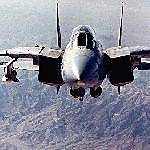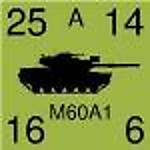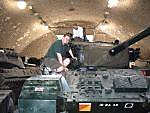Quoted Text
YEAAAAH, DAVID!!! That photo SAYS IT ALL!!!







Important facts are lost just through the passage of time, and there will always be "experts" who will distort facts to suit their own agendas. The trick is to be able to discern the truth from the chaff, and that requires a lot of research, even in today's everyday environment...





If Allied air wasn't much of a player for German armor, why do the accounts I read from German tankers talk about their fear of Allied air? A Typhoon with 20mm could easily target tanks and shoot through thin back decks. 50 cals from Thunderbolts put out a tremendous amount of rounds with 8 machineguns. How many tanks did Rudel destroy? Otto Carius complained about the Allied air.
This discussion is bypassing the Anti Tank guns which accounted for more lost tanks than German Armor. The Sherman 75mm or the British 6 pounder could easily deal with the anti tank guns but they usually fired first from ambush and that often resulted in a tank loss. if there were several anti tank guns then you could lose quiet a few tanks.

If Allied air wasn't much of a player for German armor, why do the accounts I read from German tankers talk about their fear of Allied air? A Typhoon with 20mm could easily target tanks and shoot through thin back decks. 50 cals from Thunderbolts put out a tremendous amount of rounds with 8 machineguns. How many tanks did Rudel destroy? Otto Carius complained about the Allied air.
This discussion is bypassing the Anti Tank guns which accounted for more lost tanks than German Armor. The Sherman 75mm or the British 6 pounder could easily deal with the anti tank guns but they usually fired first from ambush and that often resulted in a tank loss. if there were several anti tank guns then you could lose quiet a few tanks.





Quoted TextBetter tank is then when achieved kill in tactics - first shot-first kill. On many photographs are Tiger with hits in armor - without penetrating. Legend of Tiger I and "Tiger Fever" (in Eastern Front Ferdinand Fever) was a Tiger was unstopable,
........
"You can with it disegree, you can argument against this - but this is one who you can." (Jára D. Cimmrman - Greatest Czech inventor, thinker and philosoph of all times.)
Yes, great, but one thing you continue to MISS is that the Tiger Is, IIs and Panthers were all notoriously unreliable to the point of uselessness sometimes. Amid all the "greatness" that you tout about the German tanks, the "impervious armor," the very good gun and the "unstoppable" character of it, you forget to mention what Dennis and some other people here have: the unreliability. Even if you have the best tank in the world in terms of armor and armament, those qualities don't mean squat if that tank (and I'm taking a move out of Dennis' playbook) CAN NOT GET TO THE FIGHT. If that vehicle DOES NOT have a powerplant powerful enough to move that vehicle long distances, that tank is useless. The German vehicles would catch fire from their leaking and overheating powerplants. The Sherman would catch from improper storage of ammunition. The German heavy tanks were expensive, massively complex and notoriously unreliable. The Sherman was highly mechanically reliable, mechanically simple and relatively simple to maintain. Shermans were produced in the thousands. There were only 500 or so King Tigers.
If I had to argue which was "the best" tank the Germans put out in WWII, my vote is with the Panzer III and IV. Even though the early IVs were ON PAR with the 75mm Sherman and the latter IVs on par with the 76. Why is the III and IV my vote? They were produced in high numbers, were relatively reliable as far as I know and had the speed and mobility to get to the fight. Like I said, if you can't get to the fight, you are useless.



Zaloga also had a good point that when the Heer was on the offensive, they relied on lighter, less heavily armed, and much more reliable tanks akin to the Sherman. It wasn't until they were obviously on the defensive that they shifted from heavy tank spearheads for breakthroughs to trying to make a heavy tank like the Panther their backbone.



Quoted TextIf Allied air wasn't much of a player for German armor, why do the accounts I read from German tankers talk about their fear of Allied air? A Typhoon with 20mm could easily target tanks and shoot through thin back decks. 50 cals from Thunderbolts put out a tremendous amount of rounds with 8 machineguns. How many tanks did Rudel destroy? Otto Carius complained about the Allied air.
This discussion is bypassing the Anti Tank guns which accounted for more lost tanks than German Armor. The Sherman 75mm or the British 6 pounder could easily deal with the anti tank guns but they usually fired first from ambush and that often resulted in a tank loss. if there were several anti tank guns then you could lose quiet a few tanks.
There's a lot of reason to believe Rudel may have been not honest about his capabilities. Regardless small arms, light cannon etc did not have the required punch to generally penetrate the roof armor on tanks. The only real tank-killing equipment the fighter bomber carried was rockets and bombs, which generally were not accurate enough to get the job done (in as far as "near miss" on a truck would still wreck it and kill everyone in it, near miss on a tank, not so much).
I mean think about it, you're firing a .50 cal or 20 mm from an angle. It's not like you're getting 90 degree hits on the roof armor, and they're pretty modest projectiles at the end of the day.
Regardless do look up some of the Battle Damage Assessments of German armor located in Normandy after the fighting was over. Verified air kills only make up a fairly small portion of destroyed German armor.
As to why German aircrews feared aircraft, well, think of it this way:
What happens if you're riding outside the tank because it's hot and 20 MM hits the tank? How much warning do you really have if you're out of the hatch on your Panther and a P-47 comes in over the deck at 100 feet? Even worse, what can you as the soft squishy human on the track do to survive if you're not in the tank?
The effects of fighter bombers were again, killing a boatload of logistics assets, and constantly "disrupting" (vs destroying) German tactical movement. These were very useful and contributed a lot to victory in Europe.
Just again, the fighters were not very good tank "killers" at the end of the day.


 [/quote]
[/quote]




I swear to god if I have an irrational pet peeve in life it's the whole deutch ist besser narrative. The Germans weren't that good, they lost many battles for want of intelligent choices or due to Allied/Soviet fighting ability.



Quoted TextQuoted TextIt is worth mentioning that the reliability had a whole cascade of issues coming from it. For one thing, the Sherman could do road marches of 100's of miles and did so routinely. The tactical flexibility this allowed is not to be dismissed; if you needed M4's somewhere you figured out how fast they could drive and sent them. A thousand mile drive left you with 90+% of the Shermans ready to fight. For the Panthers and Tigers the Germans didn't dare risk them on long drives because so many would drop out along the way. So they had to line up rail transport, spend hours getting the tanks onto flat cars, and then prey to God that Allied fighters and bombers hadn't shot up the tracks or caught the train while it was rolling. Imagine the limitations that put on the commanders.
As I said earlier: The Shermans' "live" Tracks were designed to go for 2500 miles; the German Tanks, 500... This is just ONE example.
Another GREAT advantage that US Forces had, (and still do), was that the US is a Nation of Mechanics- TACKLING A MECHANICAL PROBLEM IN THE FIELD, really wasn't a big problem. American boys could figure out what it was pretty quickly, and figure out how to FIX the problem without having to wait for Ordnance or Maintenance Crews to come fix the problem- Or worse, abandoning their "ride", as many German Crews had to do with their Tanks...
What American boy growing up during the mid 1920s to late 1930s didn't have some kind of a "flivver" or "jalopy" to "soup up" or tinker with, or farm equipment that sometimes needed fixing? "Back-yard mechanics" abounded in the US, and to some extent, they still do. Even a fellow with the most basic mechanical skills during that era knew enough to keep a set of pliers, a screw driver, maybe a hammer, a tire jack, tire patches, and some baling wire in his car, "just in case". Nearly every car that was sold, re-sold, and re-sold yet again, usually included a set of tools right when it left the factory as "Standard Equipment". In short, American Tankers, AFV Crewmen, Truck Drivers and Chauffeurs were already waaaay ahead of the game even before they shipped overseas to fight a Winning War...
Patton's "Race across France" is ample evidence of American Vehicles' RELIABILITY and their Crewmen's mechanical skills, when needed to be used, and when things reeeally became complicated, our Ordnance and Maintenance organizations were there to keep our well oiled War Machine moving...
PS- Remember what Onkel Ludwig told me: "Our greatest fears were being hit with "White Phosphorous and the US/Allied JABOS..."
Also europen cars and other machinery was sold with tools for DIY fixing not only in the US and also european people at that time was a lot more DIY or "Back-yard mechanics", i think the prloblem was more the way was build the Tank facilitate the DIY of US then German



Quoted Text
I swear to god if I have an irrational pet peeve in life it's the whole deutch ist besser narrative. The Germans weren't that good, they lost many battles for want of intelligent choices or due to Allied/Soviet fighting ability.
I thought that I would be able to keep out of this but I just had to agree with the above.
The German soldier was better than everyone else.
The German officers were better than every other officer.
The German navy had far better ships (above and below the surface) than any other navy.
The German tanks were better than anyone elses.
The German aircraft were superior and their tactics was better.
The one and only thing that Germany wasn't better at was winning the war.
Something must be wrong somewhere in my text above, hmmmm,
what on earth could it be ?? Maybe the Germans didn't have the right motivation? Motivation is half the competition ?
Could it possibly be that the assumption/presumption that anything and everything German is better than anything else is incorrect ?
/ Another one who is sick and tired of "the whole deutsch ist besser narrative"




Quoted TextIf Allied air wasn't much of a player for German armor, why do the accounts I read from German tankers talk about their fear of Allied air? A Typhoon with 20mm could easily target tanks and shoot through thin back decks. 50 cals from Thunderbolts put out a tremendous amount of rounds with 8 machineguns. How many tanks did Rudel destroy? Otto Carius complained about the Allied air.
This discussion is bypassing the Anti Tank guns which accounted for more lost tanks than German Armor. The Sherman 75mm or the British 6 pounder could easily deal with the anti tank guns but they usually fired first from ambush and that often resulted in a tank loss. if there were several anti tank guns then you could lose quiet a few tanks.
Any useful reports or figures you can share?






Quoted TextQuoted TextIf Allied air wasn't much of a player for German armor, why do the accounts I read from German tankers talk about their fear of Allied air? A Typhoon with 20mm could easily target tanks and shoot through thin back decks. 50 cals from Thunderbolts put out a tremendous amount of rounds with 8 machineguns. How many tanks did Rudel destroy? Otto Carius complained about the Allied air.
This discussion is bypassing the Anti Tank guns which accounted for more lost tanks than German Armor. The Sherman 75mm or the British 6 pounder could easily deal with the anti tank guns but they usually fired first from ambush and that often resulted in a tank loss. if there were several anti tank guns then you could lose quiet a few tanks.
Any useful reports or figures you can share?
Fears are not always based on facts. People are afraid of sharks but wasps kill more humans every year than sharks do.
See also comment about wife and roaches in another post above.
There are plenty of examples to show that fears (for whatever it might be) are very rarely based on facts. The most dangerous "enemy" weapon was the mortar, not the Tiger or the T-34 or anything else.
If German tankers say that they feared JaBo's then thats what they did, even if engine fires or mechanical failures put more tanks out of operation. British 40mm slugs were sent home to Germany from North Africa to show/prove that British aircraft were lethal to tanks (even if only to or three tanks had been knocked out by aircraft). The tank is basically defenceless against the aircraft and that knowledge generates a lot of fear even if the aircraft has a hard time hitting the tank. Does the bogeyman exist? Yep, he has wings, a propeller, dives down on you from the sky and fires his guns into your back.
/ Robin

The Sherman could have been armed with the license produced 17 pdr. from 1942 on....but no...Armored Board refused it.




What's your angle here? New user, OP sounds like an ad, then very defensive about other views. Hmm!
Jim
This remarkable story exposes the Sherman tank scandal of World War II, involving some of the biggest American names and stretching from the White House and Pentagon to factories and battlefronts. Outgunned by more powerful German opponents, the inferiority of American tanks led to some of the worst setbacks of the war, prolonging it in Europe. US tankers ultimately prevailed, but over 60,000 armored division soldiers were killed and wounded; their preventable sacrifice inspired the Hollywood movie Fury.


Quoted TextWhat's your angle here? New user, OP sounds like an ad, then very defensive about other views. Hmm!
Jim
Christian: As you see, you've started quite the buzz about your upcoming book. No problem in that. However, you may help your cause and authority if you cease referring to yourself in the third person -- both here and on the FSM forum where I've seen you promote this book.
You don't have to answer every post. Simply say that you're going to humbly put your points out there in printed form and look forward to discussion. Your saying "Have you spoken with the author?" or "Have you read the book yet?" is disingenuous. You're the author so state it clearly and not post like you're a neutral actor.
If you actively chose the title (e.g "SCANDAL") , then you know you're relying on tabloid controversy to hook interest and sales. OK. But don't be shocked when, based on your chosen title alone, you spark counter-arguments. Is it balanced and will it examine all sides of the issue? Who knows -- you do. But don't act shocked that people think it's not going to be balanced. Simply b/c there are tons of citations doesn't mean a published work is balanced. I get that it may be a marketing decision -- if so, own it.
The promo language on Amazon doesn't shy away from controversial languageQuoted TextThis remarkable story exposes the Sherman tank scandal of World War II, involving some of the biggest American names and stretching from the White House and Pentagon to factories and battlefronts. Outgunned by more powerful German opponents, the inferiority of American tanks led to some of the worst setbacks of the war, prolonging it in Europe. US tankers ultimately prevailed, but over 60,000 armored division soldiers were killed and wounded; their preventable sacrifice inspired the Hollywood movie Fury.
If this is a correct summary, then your thesis is that up to 60K US casualties in US armored divisions (and for good measure, UK, Russian and allies, too, right) somehow are linked to the choice of the 75mm main gun to the M4 Medium tank. Somehow if a different gun was there, the "preventable sacrifice" is reduced or eliminated. Got it.
Remember: Schiffer also published Gary Simpson's awful book "Tiger Ace: The Life Story of Panzer Commander Michael Wittmann"




You folks know what's really funny? I haven't seen anyone state that the thread starter is the author of the book. Wonder if he is Cooper fan?
 |